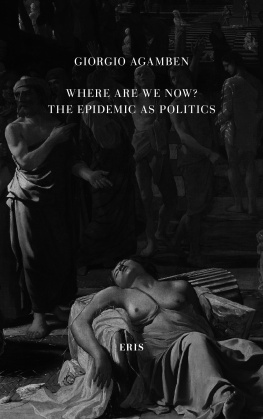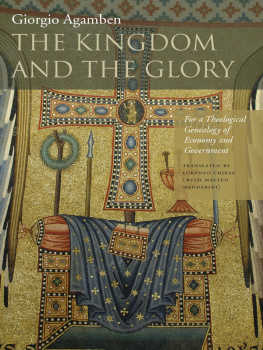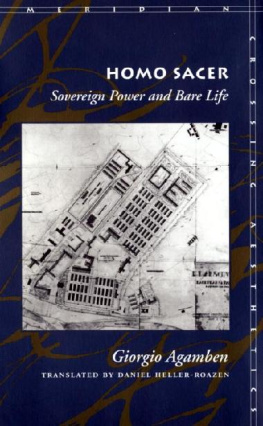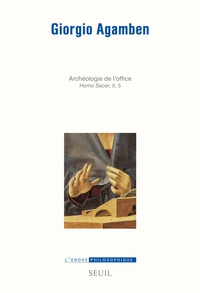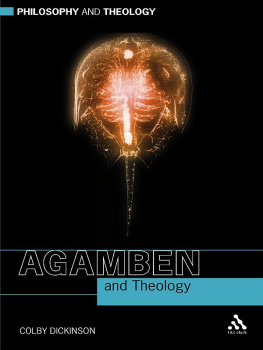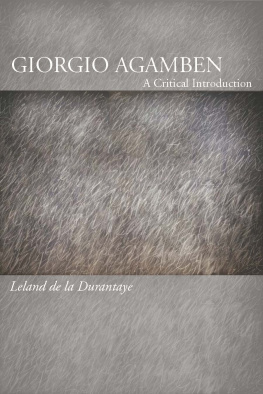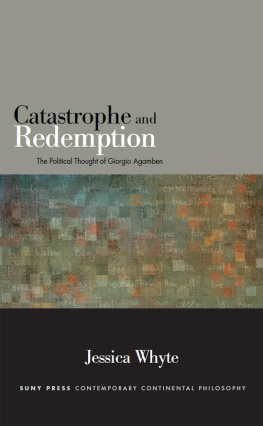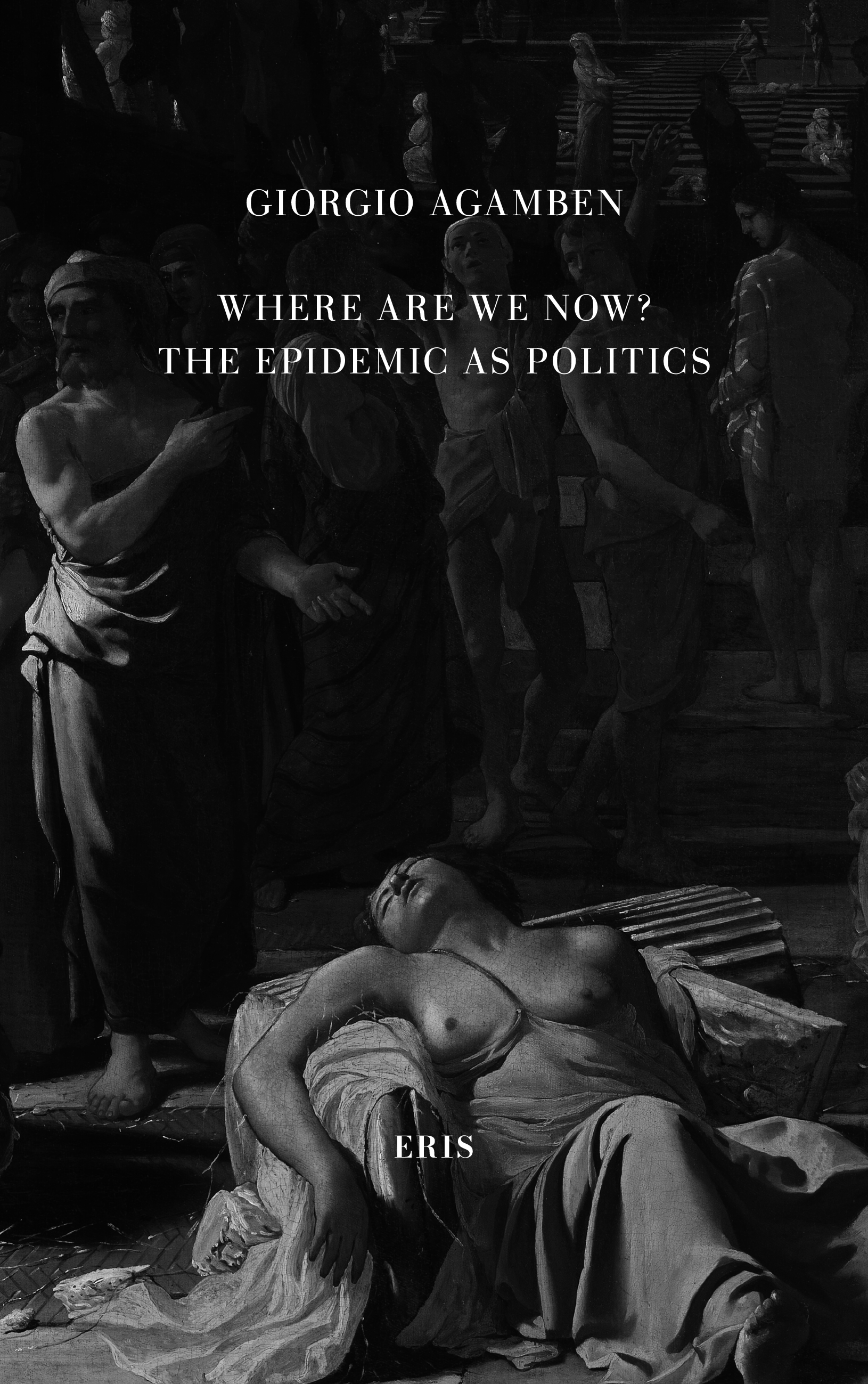Where Are We Now
This eBook is licensed to Adam Turek, turkislav@gmail.com on 03/01/2021
About the Author
Giorgio Agamben is a philosopher and political theorist who has been described as one of the most vital and most discussed figures in academia. Renowned for his insights into the history and contemporary crises of Western thought, his many works include The End of the Poem (Stanford University Press), Infancy and History (Verso Books), State of Exception (The University of Chicago Press), and The Use of Bodies (Stanford University Press), the latter of which brought to a conclusion his nine-volume Homo Sacer series. Currently based in Italy, he has held a number of distinguished academic posts, including the Baruch Spinoza Chair at the European Graduate School.
Argumentum e silentio. Speak loudly now, unspoken word.
Contents
Eight
A Question
13 April 2020
The plague was the beginning of increased lawlessness in the city. [] No one was prepared to persevere in what had once been thought the path of honour, as they could well be dead before that destination was reached.
Thucydides , The Peloponnesian War , 2.53
I would like to share with anyone interested a question on which I have been reflecting incessantly for over a month. How did it happen that an entire country, without even realising what was happening, collapsed both ethically and politically in the face of an illness? The words with which I formulate this question have been carefully chosen. The measure of ones abdication of ethical and political principles is very simple: it is a matter of asking oneself what is the limit beyond which one is unwilling to renounce those principles. Readers who think it worth their trouble to consider the following points will, I believe, find it impossible to deny thatwithout our having even noticed, or perhaps having pretended not to noticethe threshold between humanity and barbarism has been crossed.
| i. | The first and perhaps most serious point pertains to the bodies of the dead. How did we accept, purely in the name of an indeterminable risk, that our dear onesand human beings in generalshould not only die alone, but that their bodies should be burned without a funeralsomething that, from Antigone to the present day, has never happened? |
| ii. | We have also agreed, without making too much of a fuss and, again, purely in the name of an indeterminate risk, to limit our freedom of movement in a manner previously unknown in the countrys historyincluding during the two world wars, when the curfew period was limited to certain hours. Because our neighbour has become a potential source of contagion, we have effectively agreed to suspend our friendships and relationships. |
| iii. | This may have happened (and here we are approaching the root of the phenomenon) because we have divided the unity of our vital experiencewhich is always and inseparably corporeal and spiritualinto a purely biological entity, on the one hand, and a social and cultural life, on the other. Ivan Illich has highlightedand David Cayley has recently reminded us ofthe responsibility of modern medicine for this schism, which, although we take it for granted, is the greatest of all abstractions. Modern science has achieved this abstraction by way of reanimation devices that can keep a body in a state of pure vegetative life. But if this condition is extended beyond the spatial and temporal boundaries that pertain to itas is presently being attemptedso that it becomes a sort of social behaviour principle, we may fall into inescapable contradictions. |
Doubtless someone will rush to respond that what I am describing is a temporally limited condition, after which things will go back to how they were before. It is remarkable that anyone could say this in good faith, given that the very authorities that proclaimed the emergency keep endlessly reminding us that we will have to go on observing the same directives when this is all over, and that social distancing (as it has been euphemistically termed) will be societys new organising principle. In any case, what we have consented to endurein good or in bad faithcan never be erased.
At this point, and since I have remarked upon everybody elses, I should mention the most serious responsibility of those who ought to have protected human dignity. First of all, the Church. Now a handmaiden of sciencethe latter having become the true religion of our timethe Church has radically disavowed its most essential principles. Led by a Pope named Francis, it is forgetting that St Francis embraced the lepers. It is forgetting that one of the works of mercy is visiting the sick. It is forgetting the martyrs teaching that we must be willing to sacrifice life rather than faith, and that renouncing ones neighbour means renouncing faith.
Another group that has failed in its duties is the jurists. We have been accustomed for quite some time to the ill-advised use of emergency decrees through which executive power effectively replaces legislative powerabolishing the separation-of-powers principle that democracy is defined by. In this case, however, all limits have been overstepped: it seems that the words pronounced by the Prime Minister and by the head of the Civil Protection Department have the immediate validity of law (as was once said of the words of the Fhrer). It is, furthermore, unclear how the limitations on freedom can be maintained once the temporary validity of the emergency decrees expires. With what juridical apparatuses? With a permanent state of exception? It is the jurists duty to ensure that the rules of the constitution are respected, but the jurists are silent. Quare siletis juristae in munere vestro?
No doubt someone will retort that the sacrifice, serious as it is, has been made in the name of moral principles. I would remind them that Eichmann never failed to reiterateapparently in good faiththat he did what he did according to his conscience, in order to obey what he believed were the precepts of Kantian morals. A norm which affirms that we must renounce the good to save the good is as false and contradictory as that which, in order to protect freedom, imposes the renunciation of freedom.
Eighteen
State of Emergency and State of Exception
30 July 2020
In a recently published newspaper article, a jurist whom I used to think highly of tried to justify, with arguments that aspire to be legal, the state of exception that has once again been declared by the government. In an implicit reference to the Schmittian distinction between commissary dictatorshipwhose aim is to conserve or restore the constitutionand sovereign dictatorshipwhich seeks, instead, to establish a new ordersaid jurist distinguishes between emergency and exception (or, as would be more apt, between the state of emergency and the state of exception).
This argument does not, in fact, have any legal grounding: no constitution can possibly foresee its legitimate subversion. This is why Schmitt in his work Political Theology , where we find the famous definition of the sovereign as he who decides on the exception , rightly and simply speaks of the Ausnahmezustand the state of exceptionwhich, in German discourse and beyond, became the technical term for defining the no mans land between the legal order and the political fact, between law and its suspension.
Following the first Schmittian distinction, the jurist claims that the emergency is conservational, while the exception is innovational. An emergency is used to return as soon as possible to normality []; the exception is instead used to break the rule and to establish a new order. The state of emergency presupposes the stability of a system; the exception, on the other hand, its declinewhich opens the way to a different system.

